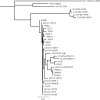Circulation of pantropic canine coronavirus in autochthonous and imported dogs, Italy
- PMID: 32163663
- PMCID: PMC7228320
- DOI: 10.1111/tbed.13542
Circulation of pantropic canine coronavirus in autochthonous and imported dogs, Italy
Abstract
Canine coronavirus (CCoV) strains with the ability to spread to internal organs, also known as pantropic CCoVs (pCCoVs), have been detected in domestic dogs and wild carnivores. Our study focused on the detection and molecular characterization of pCCoV strains circulating in Italy during the period 2014-2017 in autochthonous dogs, in dogs imported from eastern Europe or illegally imported from an unknown country. Samples from the gut and internal organs of 352 dogs were screened for CCoV; putative pCCoV strains, belonging to subtype CCoV-IIa, were identified in the internal organs of 35 of the examined dogs. Fifteen pCCoV strains were subjected to sequence and phylogenetic analyses, showing that three strains (98960-1/2016, 98960-3/2016, 98960-4/2016) did not cluster either with Italian or European CCoVs, being more closely related to alphacoronaviruses circulating in Asia with which they displayed a 94%-96% nucleotide identity in partial spike protein gene sequences. The pCCoV-positive samples were also tested for other canine viruses, showing co-infections mainly with canine parvovirus.
Keywords: animal importation; dog; pantropic canine coronavirus; viral co-infections.
© 2020 The Authors. Transboundary and Emerging Diseases published by Blackwell Verlag GmbH.
Conflict of interest statement
The authors declare that they have no conflict of interest.
Figures
References
Associated data
- Actions
- Actions
- Actions
- Actions
- Actions
- Actions
- Actions
- Actions
- Actions
- Actions
- Actions
- Actions
- Actions
- Actions
- Actions
- Actions
- Actions
- Actions
LinkOut - more resources
Full Text Sources


